Energy Consumption
Review: Ground Source Heat Pumps’ Energy Efficiency

We’ve all dealt with the annoyance of steep energy costs and ineffective heating and cooling systems.
But what if there was a solution that could not only save us money but also reduce our environmental impact?
Enter ground source heat pumps (GSHPs).
In this review, we’ll delve into the energy efficiency of GSHP systems, exploring the factors that affect their efficiency, best practices for installation, and how they compare to other heating and cooling options.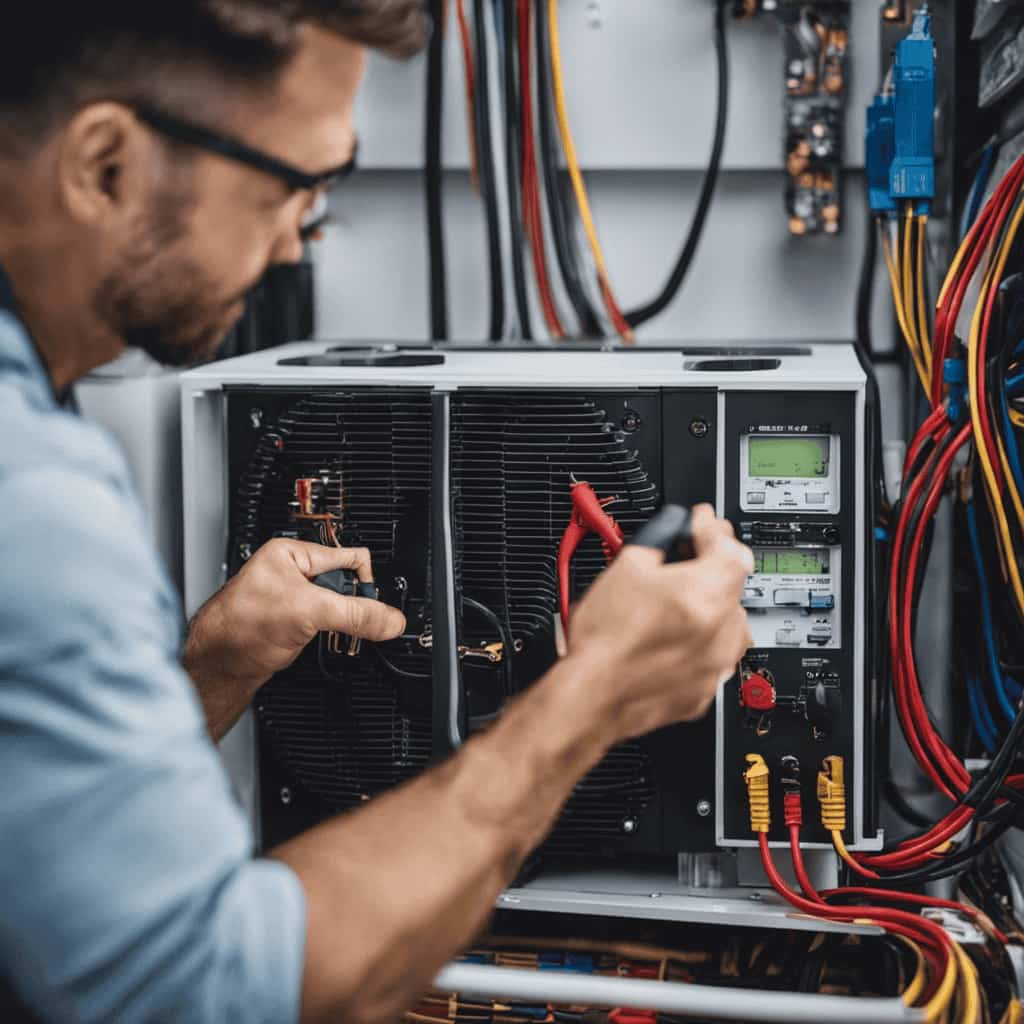
Get ready to discover a more efficient and sustainable way to heat and cool your home.
Key Takeaways
- Ground source heat pumps offer long-term energy savings and a sustainable heating solution.
- Proper system design and regular maintenance are crucial for maximizing efficiency.
- GSHP systems provide both heating and cooling, further enhancing energy efficiency.
- Optimizing control and scheduling, as well as utilizing advanced controls and monitoring systems, significantly enhance the energy efficiency of GSHP systems.
The Basics of Ground Source Heat Pumps
We’ll now dive into the basics of ground source heat pumps. Ground source heat pumps are designed to harness the natural heat stored in the ground to provide heating and cooling for buildings.
When it comes to ground source heat pump installation, it’s important to understand the process and costs involved. Installation typically involves drilling boreholes or installing horizontal loops in the ground to extract heat.
The cost of installing a ground source heat pump can vary depending on factors such as the size of the system, the type of ground loop, and the complexity of the installation. However, it’s important to note that while the upfront costs may be higher compared to traditional heating systems, ground source heat pumps offer long-term energy savings and a more sustainable heating solution.
Understanding Energy Efficiency in GSHP Systems
Our main focus is to understand the energy efficiency in GSHP systems and how it can be maximized. Improving the performance of GSHP systems is crucial in order to achieve higher energy efficiency.
There are several energy saving tips that can be implemented to enhance the overall efficiency of these systems. One important tip is to properly size the system to match the heating and cooling loads of the building. Oversized or undersized systems can lead to decreased efficiency.
Additionally, regular maintenance and cleaning of the system’s components, such as the heat exchanger and filters, can help optimize performance.
By following these energy saving tips, the energy efficiency of GSHP systems can be significantly improved.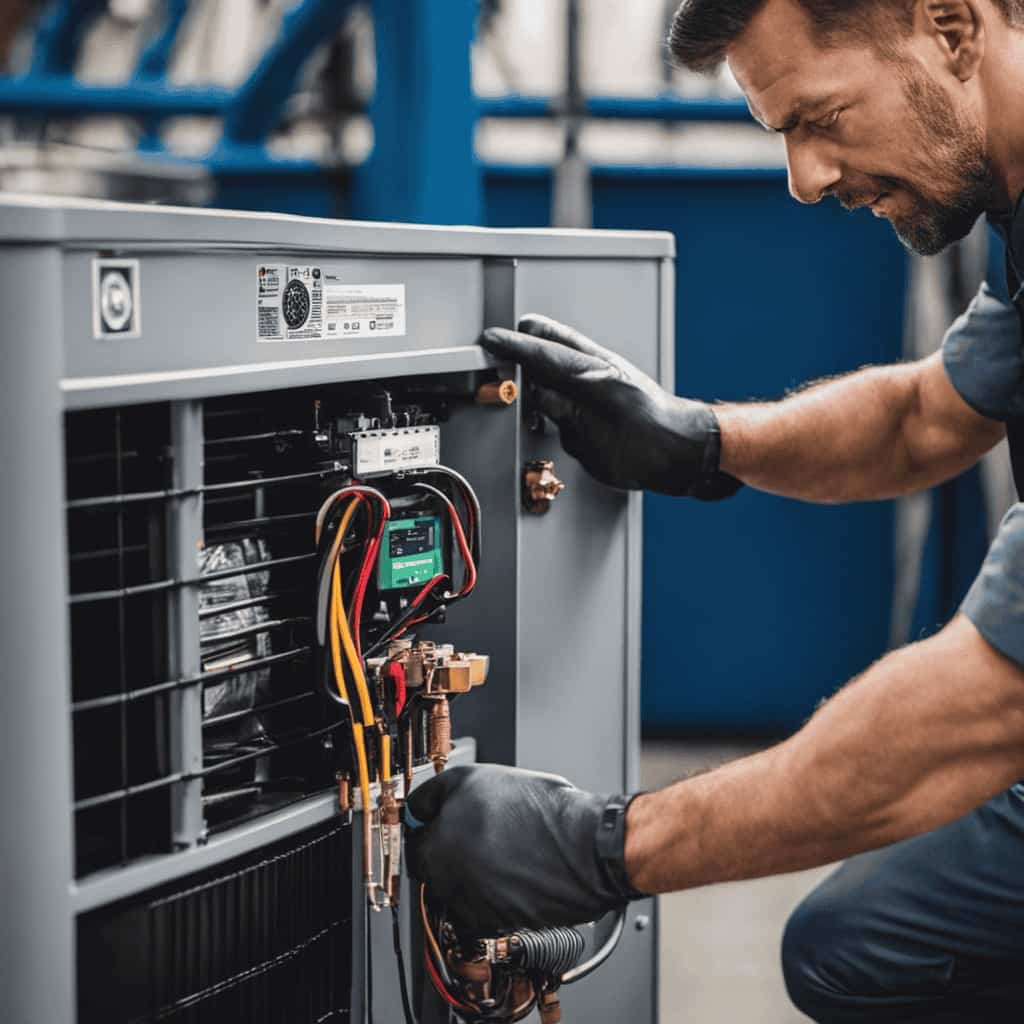
Now, let’s delve into the factors that affect the efficiency of GSHPs.
Factors Affecting the Efficiency of GSHPs
To achieve optimal efficiency, it’s important to consider the factors that can affect the performance of GSHPs. Several factors influence the performance of a ground source heat pump system, including:
Ground conditions: The thermal conductivity and capacity of the ground affect the heat transfer between the ground and the heat pump. Factors such as soil type, moisture content, and depth of the borehole can impact the system’s performance.
System design: Proper design of the GSHP system, including sizing the heat pump and ground loop correctly, is crucial for achieving high efficiency. Inefficient design can result in decreased system performance and increased energy consumption.

Maintenance and operation: Regular maintenance and proper operation of the GSHP system are essential to maintain its efficiency. Neglecting maintenance tasks such as cleaning filters or checking refrigerant levels can lead to reduced performance.
Environmental impact assessment: Consideration of environmental factors, such as the potential for ground temperature depletion or the impact on local ecosystems, is important for a sustainable and efficient GSHP system.
Understanding these factors and incorporating them into the design and operation of a GSHP system can significantly improve its efficiency. In the next section, we’ll discuss the key considerations for designing an efficient GSHP system.
Designing an Efficient GSHP System
When it comes to designing an efficient GSHP system, there are two key points to consider: optimal system configurations and efficiency-enhancing operational strategies.
Optimal system configurations involve determining the right size and layout of the ground loop, as well as selecting appropriate heat pump units.
Efficiency-enhancing operational strategies include utilizing advanced controls and monitoring systems to optimize the system’s performance.
Optimal System Configurations
Designing an efficient GSHP system involves optimizing the configuration to maximize energy efficiency. By considering the optimal system sizing and energy savings potential, we can create a highly efficient ground source heat pump system.
Here are four key factors to consider in designing an efficient GSHP system:

Properly sized ground loop: The size of the ground loop should be determined based on the heating and cooling load requirements of the building. Oversized or undersized loops can lead to reduced performance and energy efficiency.
Efficient heat exchanger design: The heat exchanger should be designed to maximize heat transfer between the ground and the refrigerant. This can be achieved through proper sizing, configuration, and selection of materials.
Effective controls and monitoring: Implementing advanced controls and monitoring systems can optimize the operation of the GSHP system, ensuring that it operates at peak efficiency and minimizes energy wastage.
Proper insulation and distribution: Well-insulated pipes and ducts, along with efficient distribution systems, can minimize heat loss during transportation, allowing for maximum energy conservation.

Efficiency-Enhancing Operational Strategies
Fortunately, by implementing efficient operational strategies and utilizing a well-designed GSHP system, we can significantly enhance energy efficiency.
One key strategy is optimizing the control and scheduling of the system. By adjusting the set point temperatures, we can ensure that the GSHP operates at its most efficient levels, reducing energy consumption and operational costs.
Additionally, implementing variable speed drives for pumps and fans can further enhance energy savings. These drives allow for the adjustment of motor speed based on the system’s demand, reducing unnecessary energy usage.
Another strategy is utilizing advanced controls and sensors to monitor and optimize system performance. By continuously monitoring factors such as outdoor temperature and heat exchange rates, we can ensure optimal system operation, minimizing energy waste.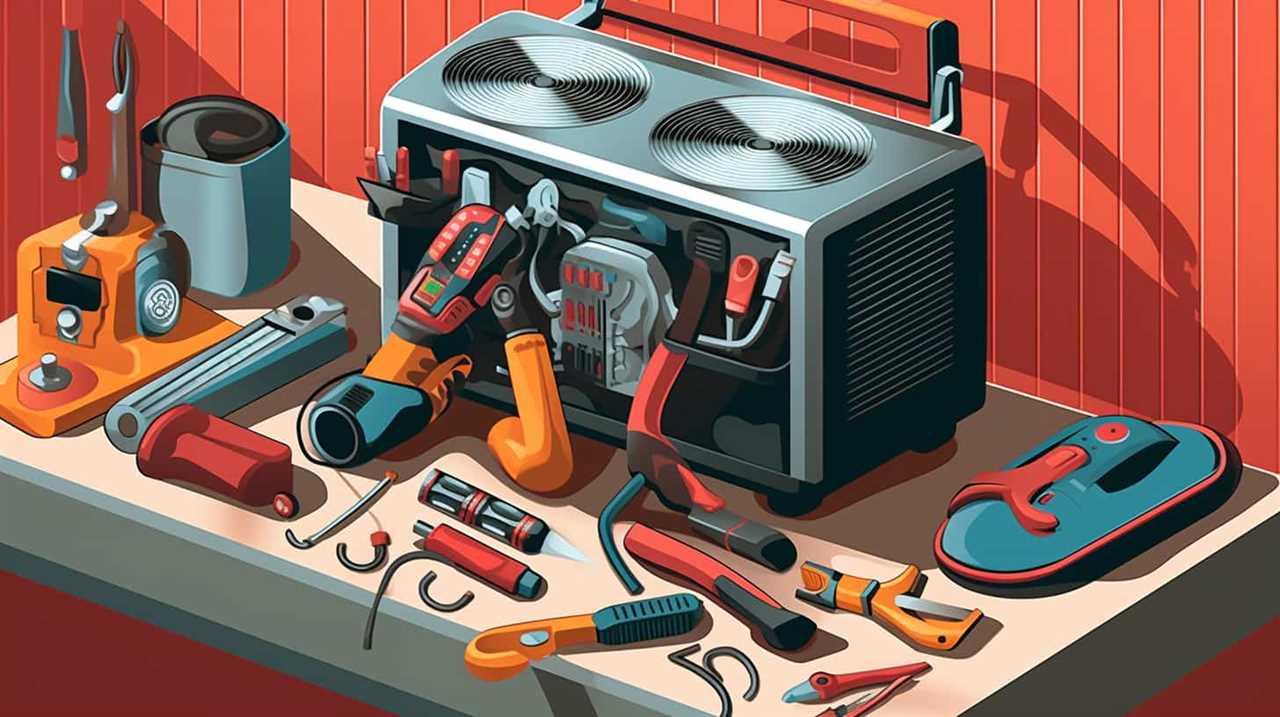
Implementing these operational strategies not only improves energy efficiency but also reduces operational costs, making GSHP systems a sustainable and cost-effective solution.
Installation Best Practices for Energy Efficient GSHPs
We can achieve optimal energy efficiency in GSHP systems by following installation best practices. Here are some installation techniques and energy-saving tips to consider:
Proper sizing: Ensure that the GSHP system is correctly sized for the building’s heating and cooling loads to avoid unnecessary energy consumption.
Optimal loop design: Design the ground loop system to minimize pressure losses, optimize heat transfer, and maximize the system’s overall efficiency.
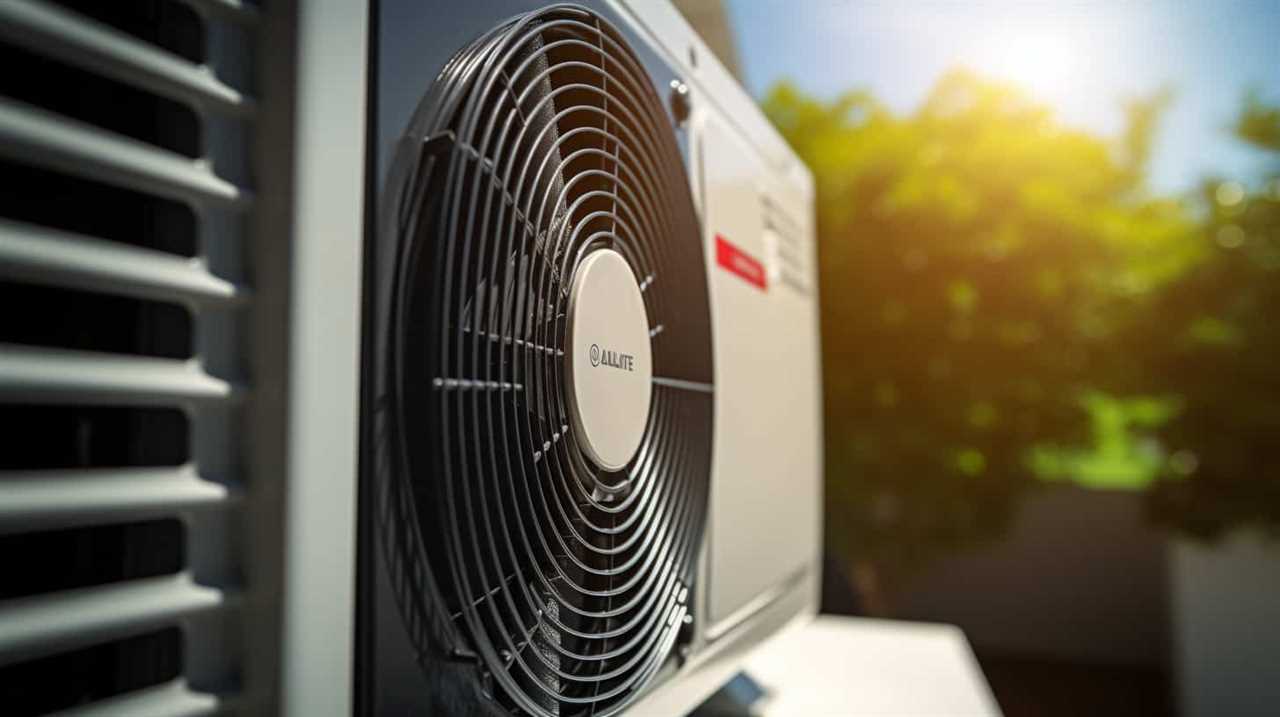
Efficient heat exchangers: Select high-quality heat exchangers with low thermal resistance to enhance heat transfer efficiency between the refrigerant and the ground loop fluid.
Effective insulation: Insulate the distribution piping to minimize heat loss during the transport of heated or cooled fluid throughout the building.
By following these installation best practices, we can maximize the energy efficiency of GSHP systems.
Now, let’s explore how we can optimize their operation for maximum energy efficiency.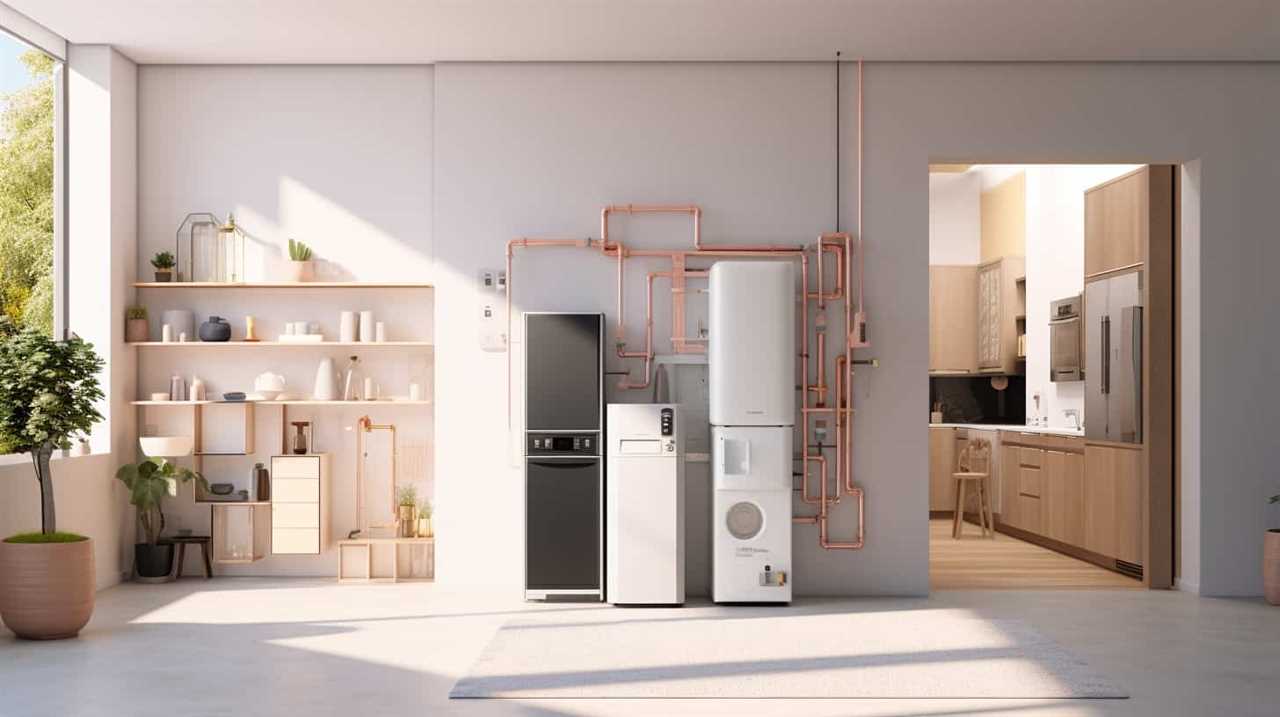
Optimizing Operation for Maximum Energy Efficiency
When it comes to optimizing the operation of ground source heat pumps for maximum energy efficiency, there are two key points that deserve attention.
Firstly, adjusting thermostat settings to appropriate levels can significantly impact energy consumption.
Secondly, regular maintenance and inspection of the system are crucial to ensure its efficient operation.
Thermostat Settings for Efficiency
To maximize energy efficiency, we should adjust the thermostat settings for optimal operation. By programming the thermostat correctly, we can achieve significant energy savings. Here are four key points to consider:
Set temperature setbacks: During periods when the building is unoccupied, such as at night or during vacations, lower the temperature to reduce heating or cooling demand. This can result in substantial energy savings over time.
Utilize programmable thermostats: These devices allow you to schedule temperature adjustments throughout the day, ensuring comfortable conditions when needed and reducing energy consumption during idle periods.
Take advantage of zoning capabilities: If your system supports zoning, adjust the temperature settings independently for different areas or zones within the building. This allows for more precise control and can lead to energy savings by only conditioning the spaces that are occupied.
Use setback recovery features: Some thermostats have a ‘recovery’ option that allows the system to gradually return the temperature to the desired level before the occupants’ scheduled arrival. This ensures comfort while minimizing energy waste.
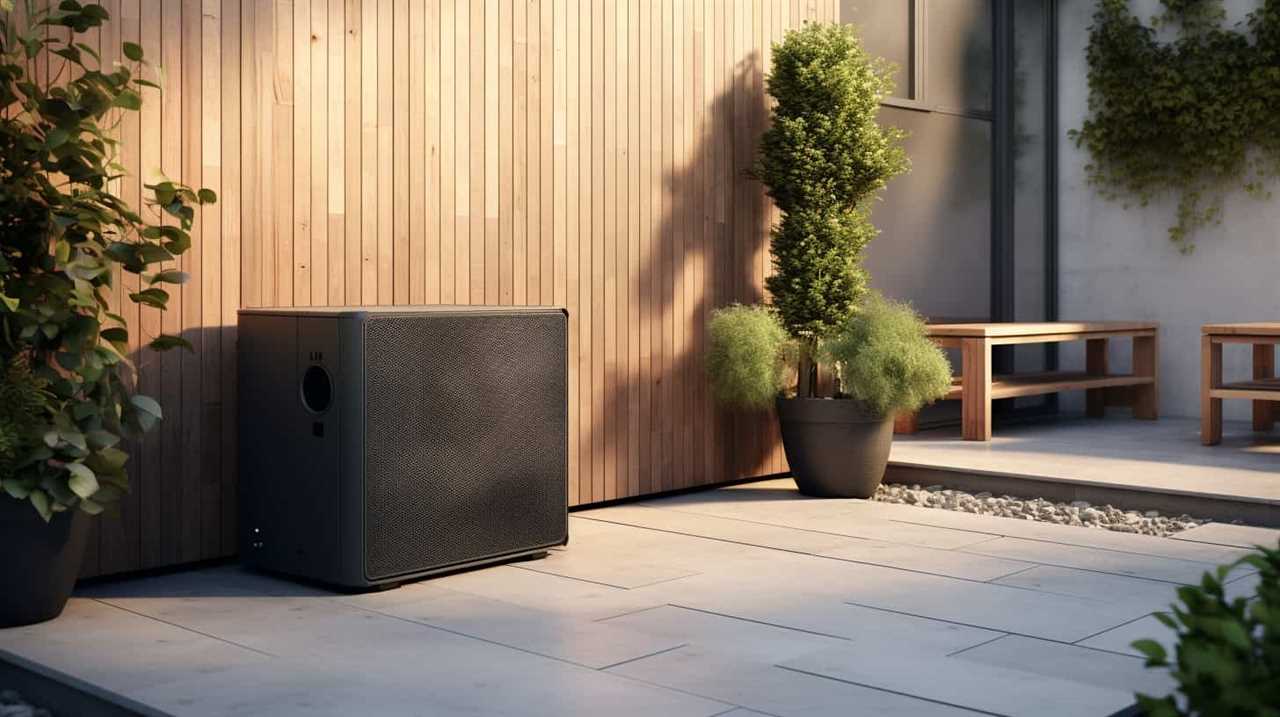
Regular Maintenance and Inspection
During regular maintenance and inspection, we should prioritize optimizing the operation of our ground source heat pump system for maximum energy efficiency. Regular maintenance plays a crucial role in ensuring the longevity and efficiency of our system.
By conducting routine inspections, we can identify any potential issues or malfunctions that may be affecting the energy efficiency of the heat pump. This allows us to address these problems promptly, minimizing energy waste and reducing operating costs.
Additionally, regular maintenance can prevent major breakdowns and costly repairs in the future. The frequency of inspections should be determined based on the manufacturer’s recommendations and the specific needs of our system.
Comparing GSHP Efficiency to Other Heating and Cooling Options
We have extensively compared the efficiency of ground source heat pumps (GSHPs) to various other heating and cooling options. Here is what we found:
- Comparing GSHP efficiency to traditional HVAC systems:
- GSHPs are significantly more energy-efficient than traditional HVAC systems.
- GSHPs can provide heating and cooling at a fraction of the energy consumption of traditional systems.
- GSHPs utilize the constant temperature of the ground to transfer heat, resulting in higher efficiency and lower energy costs.
- Analyzing the long-term cost savings of GSHPs compared to other options:
- GSHPs may have higher upfront costs, but the long-term cost savings are substantial.
- GSHPs can reduce energy bills by up to 50% compared to traditional systems.
- The energy savings over the lifespan of a GSHP can offset the initial investment within a few years.
Frequently Asked Questions
Are Ground Source Heat Pumps Suitable for All Types of Buildings and Locations?
Ground source heat pumps are suitable for most buildings and locations, but building suitability and geographic considerations play a role. It is important to assess factors such as soil conditions, available space, and local climate to determine the best fit.
How Long Does It Typically Take to Recoup the Initial Investment in a Ground Source Heat Pump System Through Energy Savings?
It typically takes several years to recoup the initial investment in a ground source heat pump system through energy savings. However, the long-term energy efficiency and cost savings make it a worthwhile investment for many buildings and locations.
What Maintenance and Upkeep Is Required for a Ground Source Heat Pump System to Maintain Its Efficiency Over Time?
Maintaining the long-term efficiency of ground source heat pump systems requires regular maintenance and upkeep. Properly cleaning and inspecting components, checking refrigerant levels, and ensuring proper airflow are critical tasks.
Are There Any Government Incentives or Rebates Available for Installing a Ground Source Heat Pump System?
There are government incentives available for installing a ground source heat pump system. These incentives can greatly reduce the initial cost and make the system more cost-effective in the long run.

Can a Ground Source Heat Pump System Be Integrated With Existing Heating and Cooling Systems in a Building?
Yes, ground source heat pump systems can be integrated with existing heating and cooling systems in buildings. The benefits of integrating these systems include increased energy efficiency, reduced carbon emissions, and improved indoor air quality.
How Do Ground Source Heat Pumps Revolutionize Energy Efficiency?
Ground source heat pumps revolutionize energy efficiency by utilizing the natural heat from the earth to provide heating, cooling, and hot water. These pumps help reduce carbon emissions, lower utility bills, and promote a sustainable lifestyle. With ground source heat pumps energy efficiency, homes and buildings can achieve a comfortable indoor climate while significantly reducing their environmental impact.
Conclusion
In conclusion, it’s clear that ground source heat pumps offer immense potential for energy efficiency.
Their ability to tap into the stable temperatures of the earth provides a reliable and sustainable heating and cooling solution.
However, despite their promising efficiency, it’s important to remember that no system is perfect. As with any technology, there are factors that can affect the performance of GSHPs.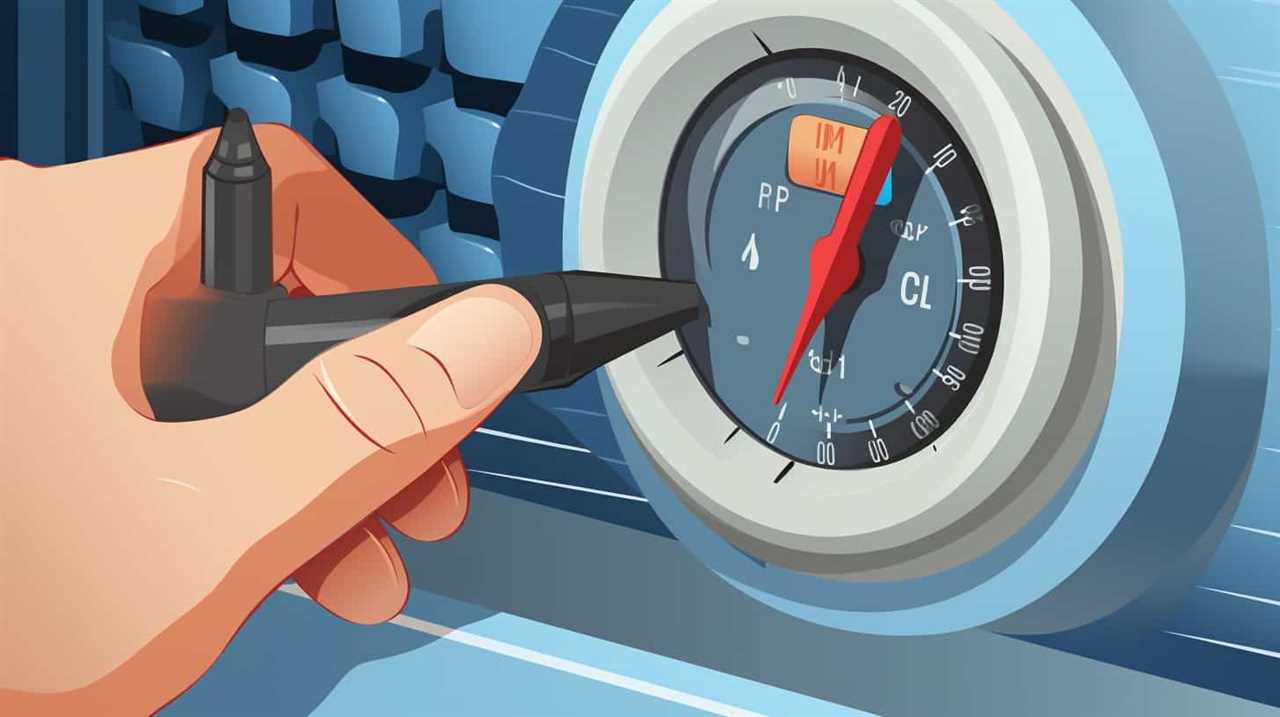
By carefully considering design, installation practices, and operational optimization, we can maximize their efficiency and contribute to a greener future.
Energy Consumption
7 Essential Factors to Understand High-Efficiency Heat Pumps

We have everything you need to know about high-efficiency heat pumps covered.
In this article, we’ll dive into the seven essential factors you need to know.
From SEER and HSPF ratings to proper sizing and the role of refrigerant, we’ll break it all down for you.
Plus, we’ll explore energy-saving features, installation tips, and regular maintenance requirements.
Get ready to make informed decisions and maximize the performance of your heat pump.
Let’s get started!
Key Takeaways
- SEER and HSPF ratings are important for measuring cooling and heating efficiency respectively, with higher ratings indicating greater efficiency and lower energy consumption.
- Proper sizing of heat pumps is crucial for optimal performance, as oversized or undersized units can waste energy and reduce efficiency.
- Variable-speed compressors offer improved energy savings, enhanced comfort, and temperature control, as well as quieter operation and extended HVAC system lifespan.
- Energy savings can be achieved with compressors by adjusting their speed based on heating or cooling needs, leading to improved energy efficiency, precise temperature control, and reduced energy consumption.
The Importance of SEER and HSPF Ratings
We need to understand the importance of SEER (Seasonal Energy Efficiency Ratio) and HSPF (Heating Seasonal Performance Factor) ratings when considering high-efficiency heat pumps. These ratings provide valuable information about the energy efficiency and performance of the heat pump, helping us make informed decisions that can significantly impact our energy consumption.
SEER rating measures the cooling efficiency of a heat pump during the cooling season. It indicates how much cooling output the heat pump provides relative to the amount of energy it consumes. A higher SEER rating means greater efficiency and lower energy consumption, resulting in reduced electricity bills.
On the other hand, HSPF rating measures the heating efficiency of a heat pump during the heating season. It represents the ratio of heat output to electricity consumption. Similar to SEER, a higher HSPF rating indicates greater efficiency and lower energy usage, saving both money and resources.
Comparing the SEER and HSPF ratings can help us understand the overall efficiency of a heat pump. It’s important to note that while a high SEER rating may indicate excellent cooling efficiency, the HSPF rating may not be as high, and vice versa. Therefore, it’s crucial to consider both ratings when selecting a high-efficiency heat pump that will effectively meet our cooling and heating needs while minimizing energy consumption.
Proper Sizing for Optimal Performance
To ensure optimal performance, it’s important to accurately size high-efficiency heat pumps. Proper sizing not only ensures efficient operation but also extends the lifespan of the system. Here are four key reasons why proper sizing is crucial for optimal performance:
-
Energy Efficiency: An oversized heat pump will cycle on and off frequently, wasting energy and reducing efficiency. On the other hand, an undersized heat pump will struggle to meet the heating or cooling demands of the space, leading to increased energy consumption. Properly sized heat pumps operate at maximum efficiency, providing the desired comfort while minimizing energy usage.
-
Comfort: Properly sized heat pumps deliver consistent and even heating or cooling throughout the space. Oversized units tend to create temperature swings, resulting in discomfort. Conversely, undersized units may struggle to maintain the desired temperature, leading to uneven heating or cooling.
-
System Lifespan: An accurately sized heat pump doesn’t have to work as hard to meet the heating or cooling demands, resulting in less wear and tear on the system. This extends the lifespan of the heat pump and reduces the need for frequent repairs or replacements.
-
Proper Installation: Proper sizing is a critical part of the installation process. A professional HVAC technician considers factors such as the size of the space, insulation levels, and climate conditions to determine the appropriate heat pump size. This ensures that the system operates efficiently and effectively from the start.
Understanding Variable-Speed Compressors
When it comes to high-efficiency heat pumps, understanding variable-speed compressors is crucial.
These compressors offer several benefits, including improved energy savings and enhanced comfort levels.
Benefits of Variable-Speed
Variable-speed compressors offer significant advantages, including improved efficiency and enhanced comfort. These benefits make them a popular choice for homeowners looking to optimize their HVAC system.
Here are four reasons why variable-speed compressors are beneficial:
-
Energy Efficiency: Variable-speed compressors can adjust their speed to match the heating or cooling demand, resulting in reduced energy consumption. This enhanced energy efficiency not only lowers utility bills but also reduces the environmental impact.
-
Temperature Control: Variable-speed compressors allow for precise temperature control by modulating their output. This ensures a more consistent indoor climate, eliminating temperature fluctuations and providing optimal comfort throughout the day.
-
Reduced Noise Levels: Compared to single-speed compressors, variable-speed compressors operate at lower speeds, resulting in quieter operation. This is especially important for homeowners who value a peaceful and quiet living environment.
-
Extended Equipment Lifespan: The ability of variable-speed compressors to operate at lower speeds and reduce on-off cycling helps extend the lifespan of the HVAC system, reducing the need for frequent repairs and replacements.
With these benefits in mind, it’s evident that variable-speed compressors are an excellent choice for homeowners seeking energy efficiency and enhanced comfort.
Now, let’s delve into the next section to explore the potential energy savings associated with compressors.
Energy Savings With Compressors
By utilizing variable-speed compressors, we can achieve energy savings and optimize the performance of our HVAC system. These compressors are designed to adjust their speed based on the heating or cooling needs of the space, resulting in improved energy efficiency and cost effectiveness.
Variable-speed compressors operate at different speeds depending on the demand for heating or cooling. This allows for better control over the temperature and reduces the amount of energy consumed.
Here is a table showcasing the benefits of variable-speed compressors:
| Benefits of Variable-Speed Compressors | |
|---|---|
| Energy Efficiency | High |
| Cost Effectiveness | High |
| Temperature Control | Precise |
| Noise Level | Low |
| System Lifespan | Extended |
As you can see, variable-speed compressors offer significant advantages in terms of energy efficiency and cost effectiveness. They provide precise temperature control, operate quietly, and contribute to an extended lifespan of the HVAC system. Investing in this technology can lead to substantial energy savings while ensuring the comfort of your space.
Improved Comfort Levels
We can enhance our comfort levels by understanding how variable-speed compressors function. Variable-speed compressors are an essential component of high-efficiency heat pumps that provide improved energy efficiency and cost savings. Here are four key reasons why variable-speed compressors contribute to improved comfort levels:
-
Enhanced temperature control: Variable-speed compressors adjust their speed to match the heating or cooling demands of the space, ensuring a more consistent and comfortable indoor temperature.
-
Reduced noise levels: Variable-speed compressors operate at lower speeds, resulting in quieter operation compared to traditional compressors. This helps create a more peaceful and enjoyable environment.
-
Improved air quality: Variable-speed compressors run for longer periods at lower speeds, allowing for better air filtration and circulation. This helps remove pollutants and allergens, leading to improved indoor air quality.
-
Precise humidity control: Variable-speed compressors can modulate their operation to dehumidify the air more effectively, creating a comfortable and balanced indoor humidity level.
The Role of Refrigerant in Efficiency
The refrigerant plays a crucial role in the efficiency of high-efficiency heat pumps. Choosing the right refrigerant type is essential for optimizing performance and minimizing environmental impact. Traditional refrigerants such as R-22 have been widely used in heat pumps, but they’ve been found to contribute to ozone depletion and global warming. In response to these environmental concerns, newer refrigerants have been developed, such as R-410A and R-32, which have significantly lower environmental impact.
R-410A, also known as Puron, is a hydrofluorocarbon (HFC) refrigerant that doesn’t contain chlorine, making it ozone-friendly. It has become the standard refrigerant for most high-efficiency heat pumps due to its excellent thermodynamic properties and high energy efficiency. R-32, another HFC refrigerant, is gaining popularity due to its lower global warming potential compared to R-410A. It offers improved energy efficiency and reduces the carbon footprint of heat pumps.
By using environmentally friendly refrigerants, high-efficiency heat pumps can’t only provide exceptional heating and cooling performance but also contribute to a sustainable future. These refrigerants are designed to maximize efficiency while minimizing negative environmental impact.
In the next section, we’ll explore the energy-saving features and technology that further enhance the efficiency of high-efficiency heat pumps.
Energy-Saving Features and Technology
With the incorporation of advanced controls and innovative technologies, high-efficiency heat pumps can effectively reduce energy consumption and optimize performance. These energy-saving features and technologies not only contribute to lower utility bills but also help protect the environment by reducing greenhouse gas emissions.
Here are four key aspects of energy-saving features and technology in high-efficiency heat pumps:
-
Energy Efficient Controls: High-efficiency heat pumps are equipped with advanced control systems that allow for precise temperature regulation and efficient operation. These controls ensure that the heat pump operates at optimal efficiency, adjusting the heating and cooling output based on the specific needs of the space.
-
Smart Technology Integration: Many high-efficiency heat pumps now incorporate smart technology, allowing homeowners to remotely control and monitor their heating and cooling systems. Through smartphone apps or web portals, users can adjust temperature settings, schedule operations, and receive energy consumption reports. This integration enables users to optimize energy usage and reduce wasteful practices.
-
Variable-Speed Compressors: High-efficiency heat pumps often feature variable-speed compressors that adjust their speed based on the demand for heating or cooling. This technology allows the heat pump to operate at lower speeds when the demand is lower, resulting in energy savings and improved comfort.
-
Heat Recovery Systems: Some high-efficiency heat pumps utilize heat recovery systems, which capture and recycle heat from areas that require cooling and transfer it to spaces that need heating. This technology maximizes energy efficiency by utilizing waste heat, reducing the overall energy consumption of the system.
Choosing the Right Installation Location
When choosing the right installation location for a high-efficiency heat pump, it’s important to consider factors such as available space, accessibility for maintenance, and proximity to the indoor and outdoor units.
The efficiency benefits of a high-efficiency heat pump can only be fully realized if it’s installed in an optimal location. First and foremost, there should be enough space around the unit to ensure proper airflow and ventilation. This is crucial for the heat pump to function efficiently and maintain its performance over time.
Additionally, accessibility for maintenance is essential for regular upkeep and servicing of the unit. It should be easy for technicians to access the heat pump for inspections, repairs, and cleaning.
Lastly, the installation location should take into account the proximity to both the indoor and outdoor units. This helps minimize the length of the refrigerant lines, reducing energy losses and maximizing the heat pump’s efficiency benefits. Moreover, choosing the right installation location can also have a positive environmental impact by reducing the energy consumption and carbon footprint of the heat pump.
Considering these factors when selecting the installation location ensures that the high-efficiency heat pump operates optimally, providing maximum efficiency benefits and minimizing its environmental impact.
Now, let’s move on to the next section, where we’ll discuss the regular maintenance and service requirements of high-efficiency heat pumps.
Regular Maintenance and Service Requirements
Regular maintenance and service are crucial for high-efficiency heat pumps to ensure optimal performance and longevity. By adhering to a regular maintenance schedule, homeowners can prevent potential issues and keep their heat pumps running efficiently.
The frequency and cost of service will vary depending on factors such as the type of heat pump and usage, but the long-term benefits of regular maintenance far outweigh the investment.
Importance of Regular Maintenance
We should prioritize maintaining our high-efficiency heat pumps to ensure optimal performance and longevity. Regular maintenance plays a crucial role in keeping our heat pumps running smoothly. Here are some important reasons why regular maintenance is essential:
-
Importance of Cleaning: Regular cleaning of the heat pump components, such as coils and filters, helps improve its efficiency by ensuring proper airflow and preventing dirt buildup that can hinder performance.
-
Troubleshooting Tips: Regular maintenance allows for the early detection of potential issues. This enables prompt troubleshooting and repairs, preventing major breakdowns and costly repairs in the future.
-
Extended Lifespan: Proper maintenance helps prolong the lifespan of the heat pump, reducing the need for premature replacements and saving money in the long run.
-
Energy Efficiency: Regular maintenance ensures that the heat pump operates at its highest efficiency, leading to reduced energy consumption and lower utility bills.
By regularly maintaining our high-efficiency heat pumps, we can maximize their performance, extend their lifespan, and minimize the risk of unexpected breakdowns.
Now, let’s delve into the next section about service frequency and cost.
Service Frequency and Cost
To ensure optimal performance and minimize potential problems, it is important for homeowners to schedule regular maintenance and be aware of the associated costs of servicing high-efficiency heat pumps. Regular maintenance helps to extend the lifespan of the heat pump and ensures that it operates at peak efficiency. Service intervals for high-efficiency heat pumps typically range from once a year to once every three years, depending on the manufacturer’s recommendations. It is crucial to adhere to these service intervals to prevent any potential issues and to maintain the heat pump’s performance. While the cost of servicing high-efficiency heat pumps may vary depending on factors such as the complexity of the system and the service provider, regular maintenance is generally considered cost-effective in the long run. By investing in regular maintenance, homeowners can avoid costly repairs and enjoy the benefits of a properly functioning heat pump for years to come.
| Service Interval | Frequency | Cost |
|---|---|---|
| Annual | Once a year | $100 – $300 |
| Biennial | Once every 2 years | $200 – $400 |
| Triennial | Once every 3 years | $300 – $500 |
Table 1: Service Intervals and Associated Costs for High-Efficiency Heat Pumps.
Please note that the costs provided in the table are approximate and may vary depending on various factors such as the location, the complexity of the system, and the specific maintenance tasks required. It is recommended to consult with a qualified HVAC professional for accurate cost estimates. Additionally, homeowners may also consider purchasing maintenance plans or service contracts offered by HVAC companies, which can provide additional benefits and cost savings in the long term.
Long-Term Performance Benefits
Regular maintenance and service requirements play a crucial role in ensuring the long-term performance benefits of high-efficiency heat pumps. Here are four ways in which they contribute:
-
Enhanced Efficiency: Regular maintenance helps keep the heat pump operating at its peak efficiency, reducing energy consumption and lowering long-term costs.
-
Extended Lifespan: Proper maintenance and servicing can extend the lifespan of the heat pump, reducing the need for premature replacement and further reducing long-term costs.
-
Improved Indoor Air Quality: Regular maintenance includes cleaning and replacing air filters, ensuring clean and fresh air circulation, which contributes to a healthier indoor environment.
-
Reduced Environmental Impact: By maintaining optimal performance, high-efficiency heat pumps consume less energy and reduce greenhouse gas emissions, minimizing their environmental impact over the long term.
Frequently Asked Questions
Are High-Efficiency Heat Pumps More Expensive to Purchase and Install Compared to Standard Models?
High-efficiency heat pumps can be more expensive to purchase and install compared to standard models. However, it’s important to consider the long-term benefits and cost savings they provide.
While the upfront cost may be higher, high-efficiency heat pumps offer significant energy savings over time. With their advanced technology and ability to efficiently transfer heat, these pumps can greatly reduce your energy consumption and lower your utility bills.
Can a High-Efficiency Heat Pump Be Used in Any Climate or Are They Only Suitable for Specific Regions?
In considering the use of high-efficiency heat pumps in different geographical locations, it’s important to understand their advantages in extreme climates.
High-efficiency heat pumps are designed to perform well in both hot and cold conditions, making them suitable for a wide range of climates.
However, it’s still necessary to consider factors such as insulation, sizing, and auxiliary heating options to ensure optimal performance in specific regions.
How Long Can a High-Efficiency Heat Pump Last Before It Needs to Be Replaced?
High-efficiency heat pumps have a significant longevity, which is an important factor to consider when investing in this technology. The replacement timeline for a high-efficiency heat pump can vary depending on several factors, such as regular maintenance, usage patterns, and environmental conditions.
However, on average, these heat pumps can last between 15 to 20 years before they may need to be replaced. It’s crucial to follow manufacturer recommendations and schedule regular inspections to ensure optimal performance and extend the lifespan of the heat pump.
Do High-Efficiency Heat Pumps Require Any Additional Equipment or Modifications to the Existing HVAC System?
When considering high-efficiency heat pumps, it’s important to understand if any additional equipment or modifications are required for the existing HVAC system.
High-efficiency heat pumps may require additional equipment such as a variable-speed air handler or a desuperheater for hot water production.
Additionally, modifications to the existing ductwork or electrical system may be necessary to ensure optimal performance and efficiency.
Consulting with a professional HVAC technician is recommended to determine the specific requirements for your system.
Are There Any Tax Credits or Incentives Available for Purchasing and Installing a High-Efficiency Heat Pump?
Yes, there are tax credits and incentives available for purchasing and installing a high-efficiency heat pump. These incentives vary depending on your location, but they can provide significant financial benefits.
Installing a high-efficiency heat pump not only helps you save on your energy bills but also qualifies you for these tax credits. It’s a win-win situation as you contribute to a cleaner environment while enjoying the benefits of energy savings and financial incentives.
What Are the Savings I Can Expect from Installing a High-Efficiency Heat Pump?
Wondering about the savings you can expect from a high-efficiency heat pump? Look no further than the heat pump savings checklist. Installing a high-efficiency heat pump can result in substantial energy savings. Enjoy reduced heating and cooling costs, lower energy consumption, and potential eligibility for government rebates. Upgrade to a high-efficiency heat pump and experience long-term financial benefits while enjoying a comfortable home.
Conclusion
In conclusion, understanding the essential factors of high-efficiency heat pumps is crucial for optimal performance and energy savings.
Just like a well-tuned instrument, these heat pumps require proper sizing, regular maintenance, and the right installation location to harmoniously deliver comfort and efficiency.
By considering SEER and HSPF ratings, variable-speed compressors, refrigerant efficiency, and energy-saving features, homeowners can create a symphony of cost-effective heating and cooling.
So, let’s orchestrate our homes with high-efficiency heat pumps and enjoy the sweet melody of energy savings.
Energy Consumption
Optimal Electricity Usage: Top Heat Pump Efficiency Tips

Are you searching for ways to increase energy efficiency and reduce your electricity consumption? You’re in luck! We have you covered with our best heat pump efficiency tips.
By understanding efficiency ratings, sizing and installing your heat pump properly, regular maintenance, and optimizing thermostat settings, you can save both energy and money.
Plus, we’ll show you how smart home technology can further enhance your heat pump’s efficiency.
Get ready to take control of your electricity usage and enjoy the freedom of a more efficient home.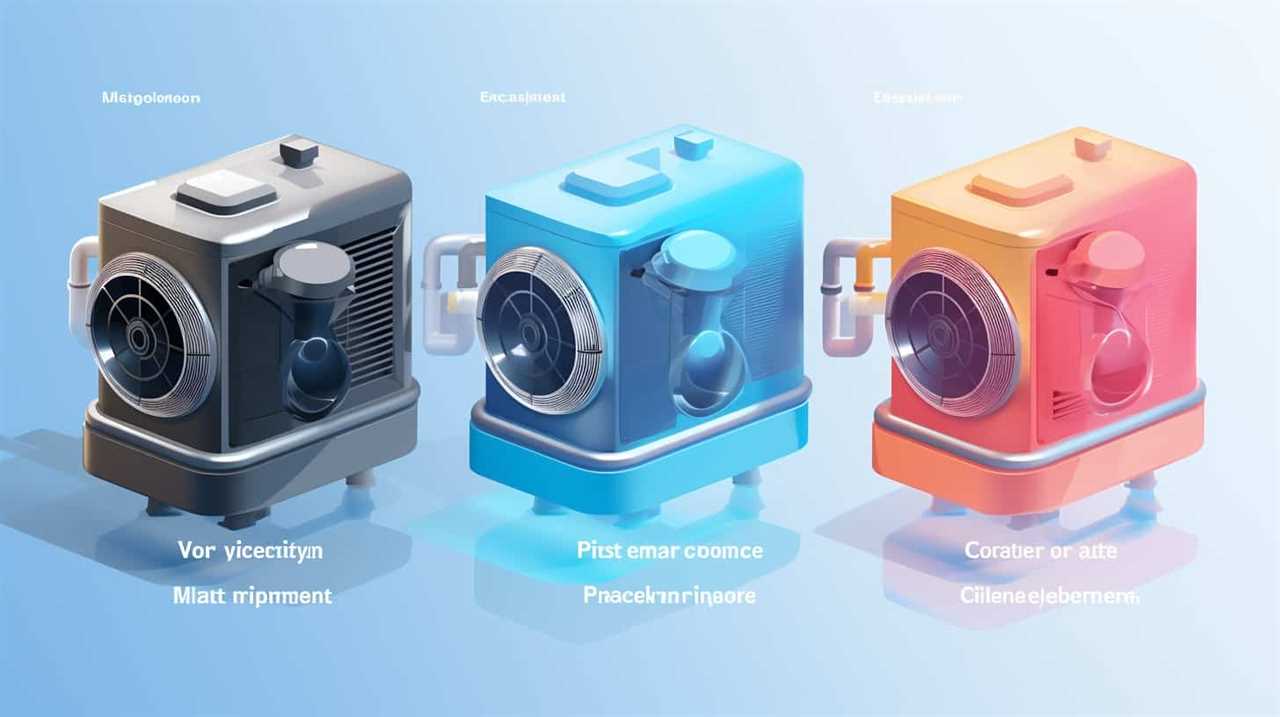
Key Takeaways
- Understanding heat pump efficiency ratings such as SEER, HSPF, and EER is crucial for maximizing energy savings.
- Proper sizing and installation of a heat pump ensures effective heating or cooling without energy waste.
- Regular maintenance and cleaning, including replacing air filters and cleaning the outdoor unit, can improve heat pump efficiency.
- Optimizing thermostat settings and supplementing with smart home technology can enhance energy efficiency and control electricity usage.
Understanding Heat Pump Efficiency Ratings
We’ll start by exploring the three main heat pump efficiency ratings. When it comes to heat pump technology and energy efficient heating, understanding these ratings is crucial.
The first rating to consider is the Seasonal Energy Efficiency Ratio (SEER). This measures the cooling efficiency of the heat pump and is calculated by dividing the cooling output by the energy input over a typical cooling season.
The second rating is the Heating Seasonal Performance Factor (HSPF), which measures the heating efficiency of the heat pump. It’s calculated by dividing the total heating output by the total electrical energy input over a typical heating season.
The third rating is the Energy Efficiency Ratio (EER), which measures the cooling efficiency of the heat pump at a specific outdoor temperature.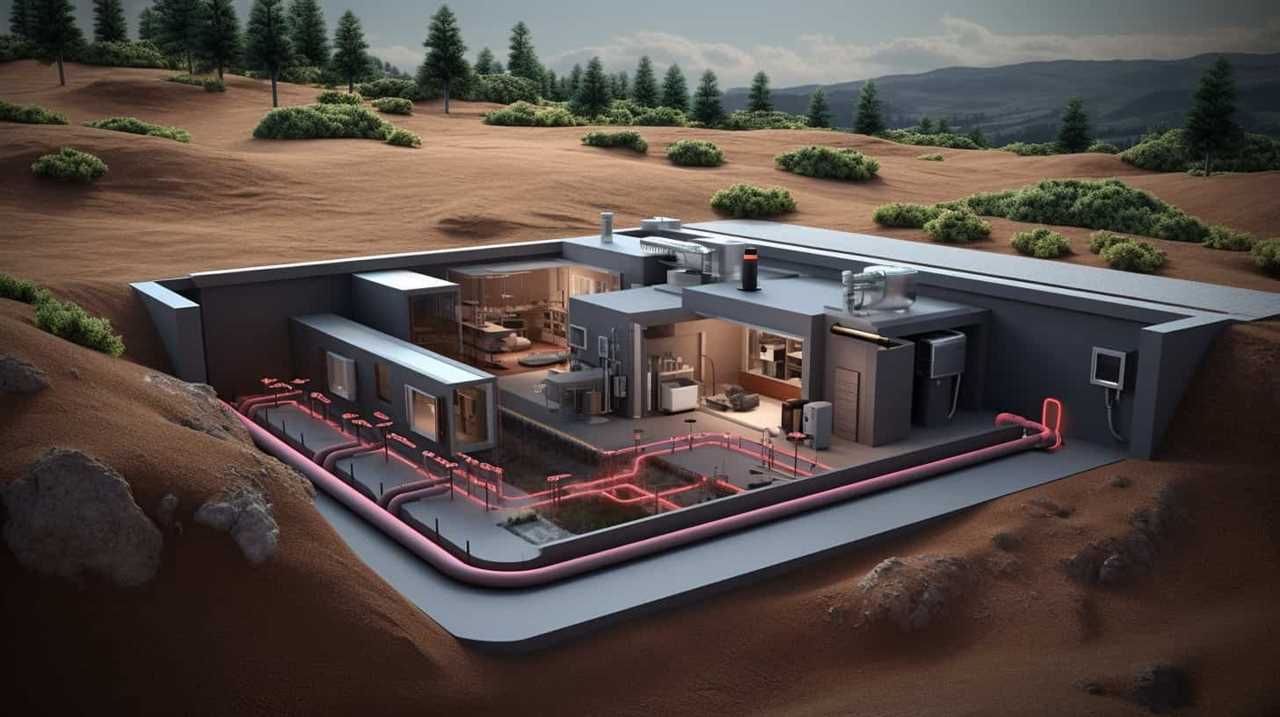
Proper Sizing and Installation for Maximum Efficiency
For maximum efficiency, we recommend ensuring proper sizing and installation of your heat pump.
Proper sizing is crucial to ensure that your heat pump can effectively heat or cool your space without wasting energy. A heat pump that’s too small will struggle to meet the demands of your home, leading to increased energy consumption and higher utility bills. On the other hand, a heat pump that’s too large will cycle on and off frequently, resulting in inefficient operation and unnecessary wear and tear. To determine the right size for your heat pump, it’s best to consult with a professional HVAC technician who can perform a load calculation based on the size and layout of your home.
Additionally, proper installation is essential for optimal performance. Improper installation can lead to air leakage, reduced efficiency, and potential safety hazards. It’s crucial to hire a qualified and experienced HVAC contractor to ensure that your heat pump is installed correctly.
Regular heat pump maintenance is also important for energy savings. Cleaning or replacing air filters regularly, inspecting and cleaning coils, and checking refrigerant levels can all help improve the efficiency of your heat pump.

Regular Maintenance and Cleaning to Improve Efficiency
Regular maintenance and cleaning are essential to improve the efficiency of our heat pump. By following proper maintenance schedules and regularly cleaning our heat pump, we can ensure that it operates at optimal efficiency. Here are three important steps to consider:
Regular filter replacement: One of the simplest yet most effective ways to improve heat pump efficiency is by regularly replacing the air filters. Clogged filters restrict airflow, forcing the system to work harder and use more energy. By replacing the filters as recommended by the manufacturer, we can ensure proper airflow and maximize efficiency.
Cleaning the outdoor unit: The outdoor unit of the heat pump can accumulate dirt, leaves, and debris over time, obstructing airflow. Regularly cleaning the unit by removing any debris and ensuring unobstructed airflow can significantly improve efficiency and prevent potential issues.
Professional maintenance: It’s also advisable to schedule regular professional maintenance for our heat pump. A qualified technician can inspect and clean the system thoroughly, identifying any potential issues and ensuring that all components are functioning optimally.
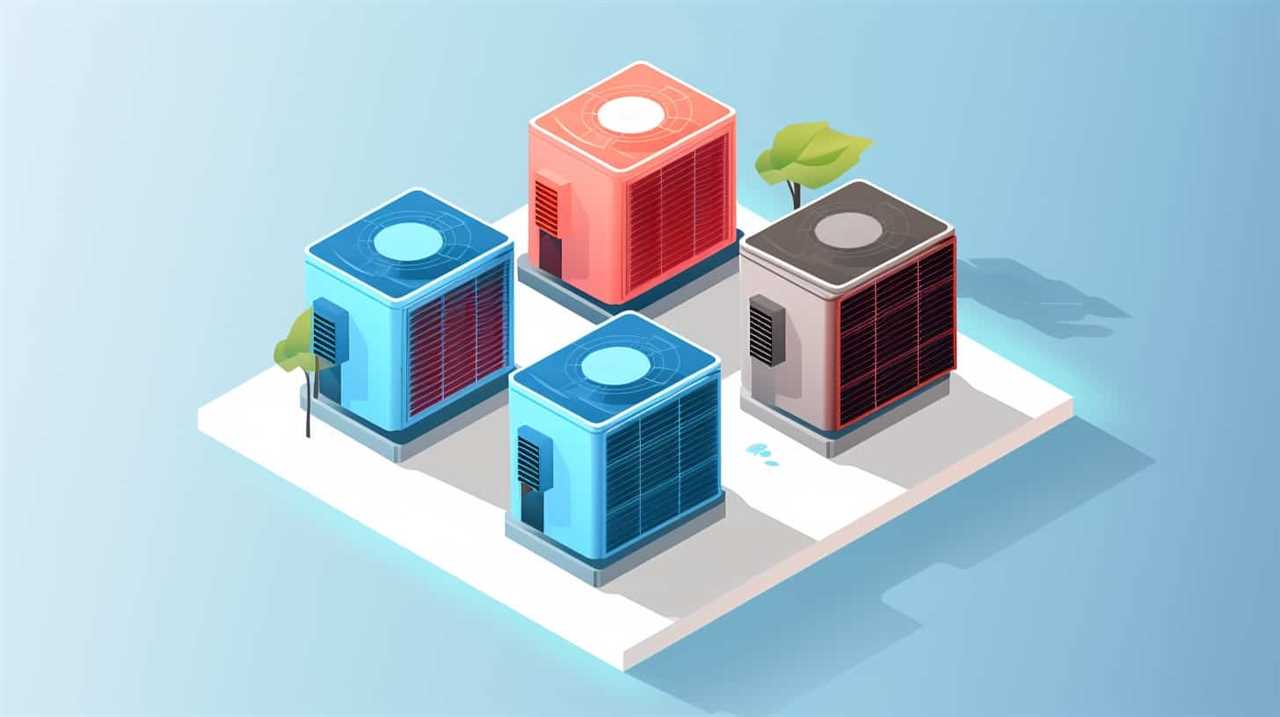
Optimizing Thermostat Settings for Energy Savings
The optimal thermostat settings can significantly impact our energy savings. By setting our thermostats to energy efficient temperature settings, we can reduce our energy consumption and save money on our electricity bills. Smart home automation systems can also help us achieve these energy savings by allowing us to control and monitor the temperature settings remotely. Here is a table showcasing some recommended temperature settings for different scenarios:
| Scenario | Recommended Temperature |
|---|---|
| Occupied | 68-72°F |
| Sleeping | 65-68°F |
| Away | 60-65°F |
Supplementing With Smart Home Technology for Enhanced Efficiency
With smart home technology, we can enhance our efficiency in using heat pumps by integrating automated controls and monitoring systems. By incorporating smart home automation into our heating systems, we can optimize energy usage and reduce wasted electricity. Here are three ways smart home technology can help us achieve enhanced efficiency:
Automated Scheduling: Smart thermostats allow us to create customized heating schedules based on our daily routines. This ensures that the heat pump operates only when needed, saving energy and reducing electricity bills.
Remote Access: With smart home automation, we can control our heat pumps remotely through smartphone apps. This allows us to adjust the temperature and monitor energy usage even when we’re away from home, giving us greater control and flexibility.
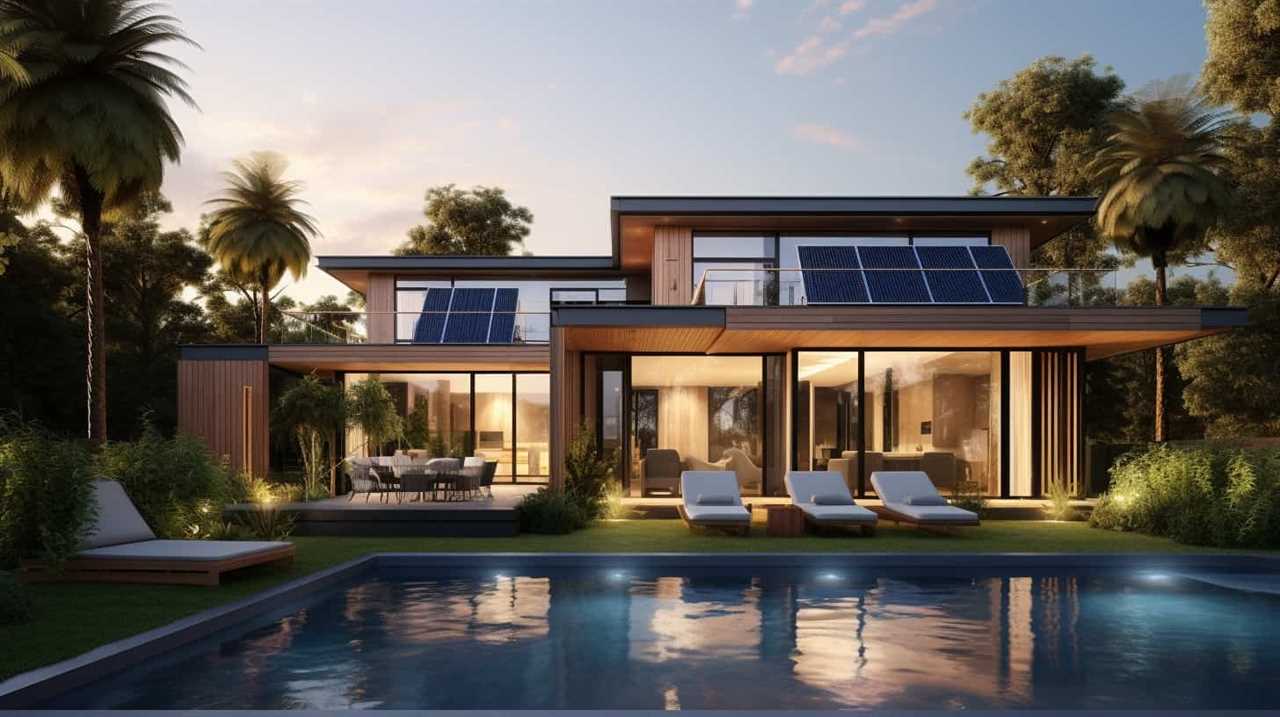
Energy Monitoring: Smart home systems provide real-time energy consumption data, allowing us to track our usage and identify areas of improvement. By understanding how much energy our heat pumps are using, we can make informed decisions to optimize efficiency and reduce waste.
Frequently Asked Questions
Are There Any Government Incentives or Rebates Available for Homeowners Who Install Heat Pumps?
There are government incentives and energy rebates available for homeowners who install heat pumps. These incentives and rebates can help offset the cost of installation and encourage energy-efficient practices in homes.
Can a Heat Pump Be Used in Extremely Cold Climates, or Is It Only Effective in Moderate Temperatures?
Can a heat pump handle extreme cold or only work in moderate temperatures? We’ll explore heat pump efficiency in both scenarios and share maintenance tips for optimal performance and longevity.
How Long Does a Heat Pump Typically Last Before Needing to Be Replaced?
Heat pumps typically last around 15-20 years before needing replacement. Regular heat pump maintenance, such as cleaning filters and checking for signs of a failing heat pump, can help extend its lifespan.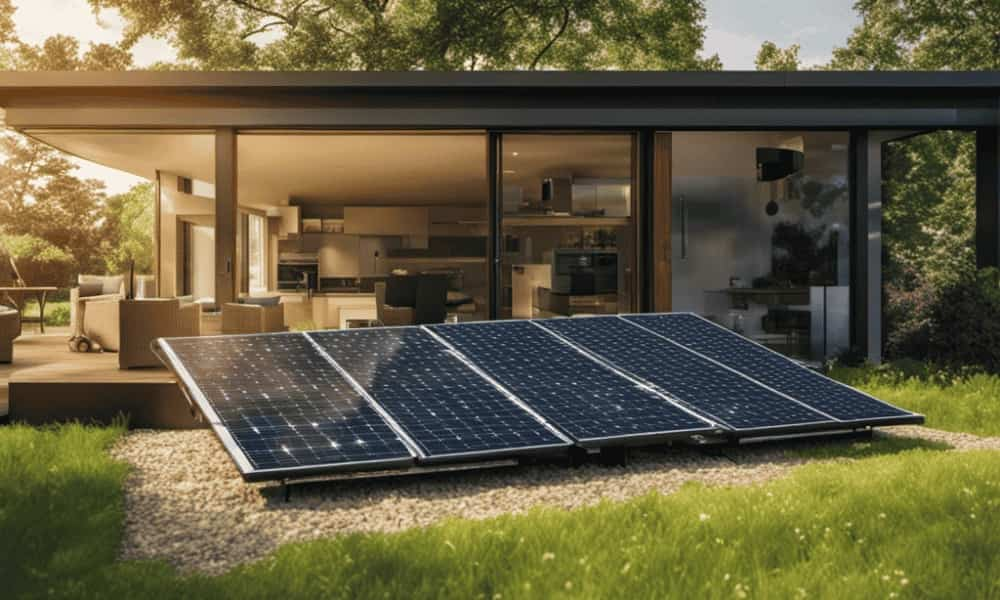
Are There Any Common Issues or Problems That Can Arise With a Heat Pump System?
Common issues with heat pump systems can include refrigerant leaks, frozen coils, and inadequate heating or cooling. Troubleshooting heat pump problems may involve checking for proper airflow, ensuring thermostat settings are correct, and scheduling regular maintenance.
Can a Heat Pump Be Used for Both Heating and Cooling, or Is It Primarily Designed for One Function?
A heat pump can be used for both heating and cooling. It is designed to efficiently transfer heat from one location to another, making it versatile in its applications for both hot and cold climates.
How Can I Maximize the Energy Efficiency of My Heat Pump from a Top Brand?
Looking for ways to maximize the energy efficiency of your heat pump? Start by investing in one of the top heat pump brands for energy efficiency. These brands prioritize eco-friendly features and advanced technology, ensuring your heat pump operates at its full potential. Additionally, regular maintenance, proper insulation, and optimizing thermostat settings can further enhance the energy efficiency of your heat pump from a top brand.
Conclusion
To sum it up, by following these heat pump efficiency tips, we can zap our energy bills and keep our homes cozy without breaking a sweat. With proper sizing, installation, regular maintenance, and optimized thermostat settings, we can make sure our heat pumps are running at their best.
And for those looking for extra efficiency, smart home technology can be the cherry on top.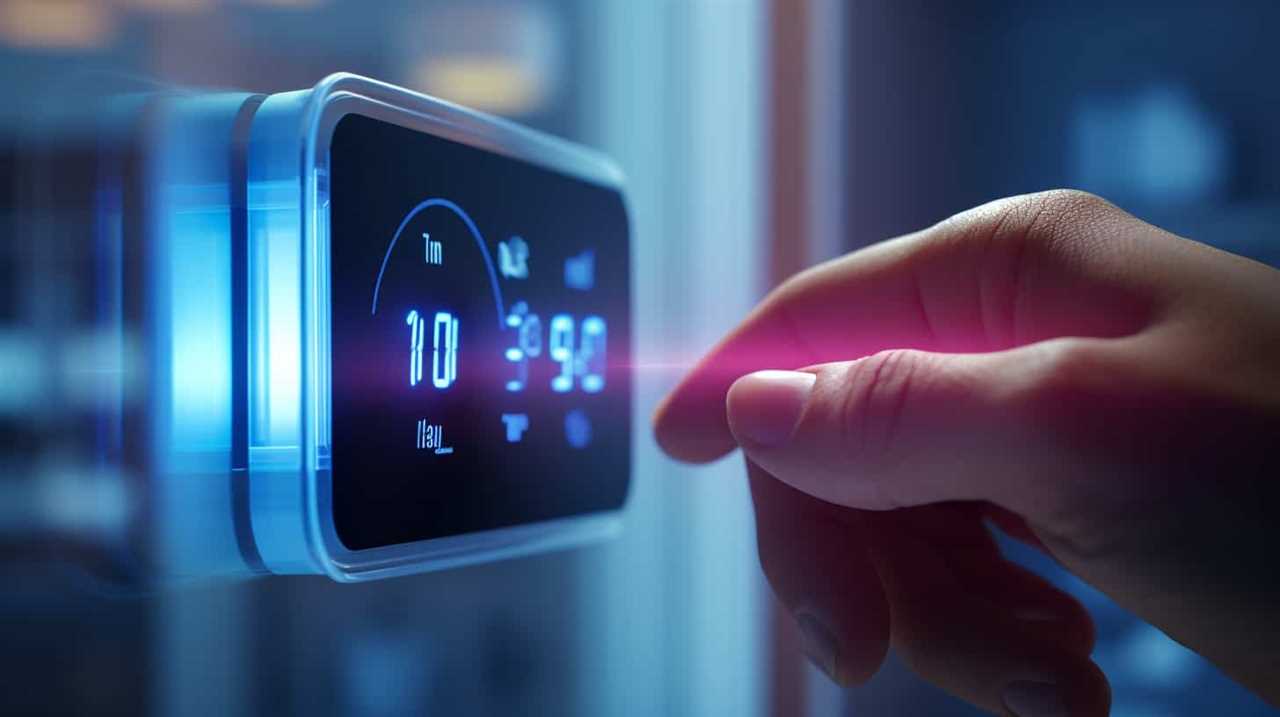
Let’s stay warm and save energy, all while keeping our wallets happy.
Energy Consumption
Instant HVAC Efficiency Gains With Heat Pump Systems

Are you exhausted from receiving high energy bills and dealing with inefficient HVAC systems? You’re in luck! We have the perfect solution for you.
With heat pump systems, we can instantly improve your HVAC efficiency, saving you money and reducing your carbon footprint. These systems are packed with key features and benefits that will revolutionize your home’s heating and cooling.
Don’t settle for outdated technology, join us as we explore the world of heat pump systems and unlock the true potential of your HVAC system.
Key Takeaways
- Heat pump systems reduce the carbon footprint associated with heating and cooling processes.
- They provide both heating and cooling capabilities, reducing reliance on fossil fuels.
- Heat pump systems offer cost savings through reduced energy consumption and lower utility bills.
- They can be integrated with renewable energy sources like solar panels or geothermal energy.
The Importance of Heat Pump Systems in HVAC Efficiency
We believe that heat pump systems play a crucial role in improving HVAC efficiency.
Heat pump systems have the potential to significantly reduce the carbon footprint associated with heating and cooling processes. By utilizing renewable energy sources such as air, ground, or water, heat pumps can extract heat from these sources and transfer it into buildings, providing both heating and cooling capabilities. This reduces the reliance on fossil fuels and decreases greenhouse gas emissions, ultimately contributing to a greener and more sustainable environment.
Additionally, heat pump systems offer potential cost savings in HVAC operations. They’re highly efficient in converting energy, resulting in reduced energy consumption and lower utility bills. With their ability to provide both heating and cooling, heat pump systems offer a versatile and cost-effective solution for HVAC needs.
Transitioning into the subsequent section, let’s explore the key features and benefits of heat pump systems.
Key Features and Benefits of Heat Pump Systems
Heat pump systems offer numerous key features and benefits to enhance HVAC efficiency.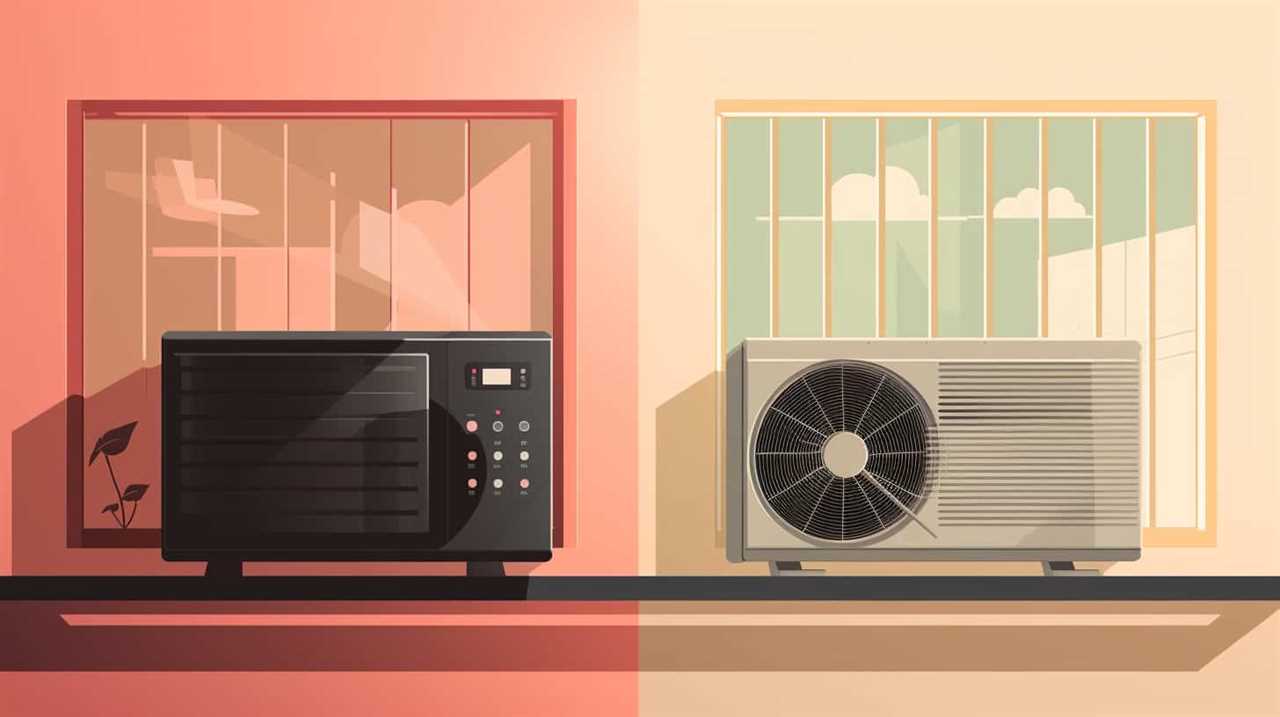
One of the most significant advantages is energy savings. Heat pumps are highly efficient in transferring heat from one area to another, making them more energy-efficient compared to traditional heating and cooling systems. This results in lower energy consumption and reduced utility bills for homeowners and businesses.
Additionally, heat pumps have a lower environmental impact. They use renewable energy sources such as air or ground heat, reducing greenhouse gas emissions and dependence on fossil fuels.
How Heat Pump Systems Improve Energy Efficiency in HVAC
By optimizing heat transfer and reducing energy consumption, heat pump systems significantly enhance the energy efficiency of HVAC systems. These systems offer several advantages that contribute to cost savings and reduce environmental impact:
Improved Heat Transfer: Heat pump systems transfer heat from one location to another, rather than generating it from scratch. This process requires less energy compared to traditional heating and cooling methods.

Dual Functionality: Heat pump systems provide both heating and cooling capabilities, eliminating the need for separate systems. This reduces energy consumption and maintenance costs.
Renewable Energy Integration: Heat pump systems can be integrated with renewable energy sources, such as solar panels or geothermal energy, further reducing reliance on fossil fuels.
With these benefits, heat pump systems offer a sustainable and cost-effective solution for HVAC needs.
In the following section, we’ll explore tips for maximizing HVAC efficiency with heat pump systems.
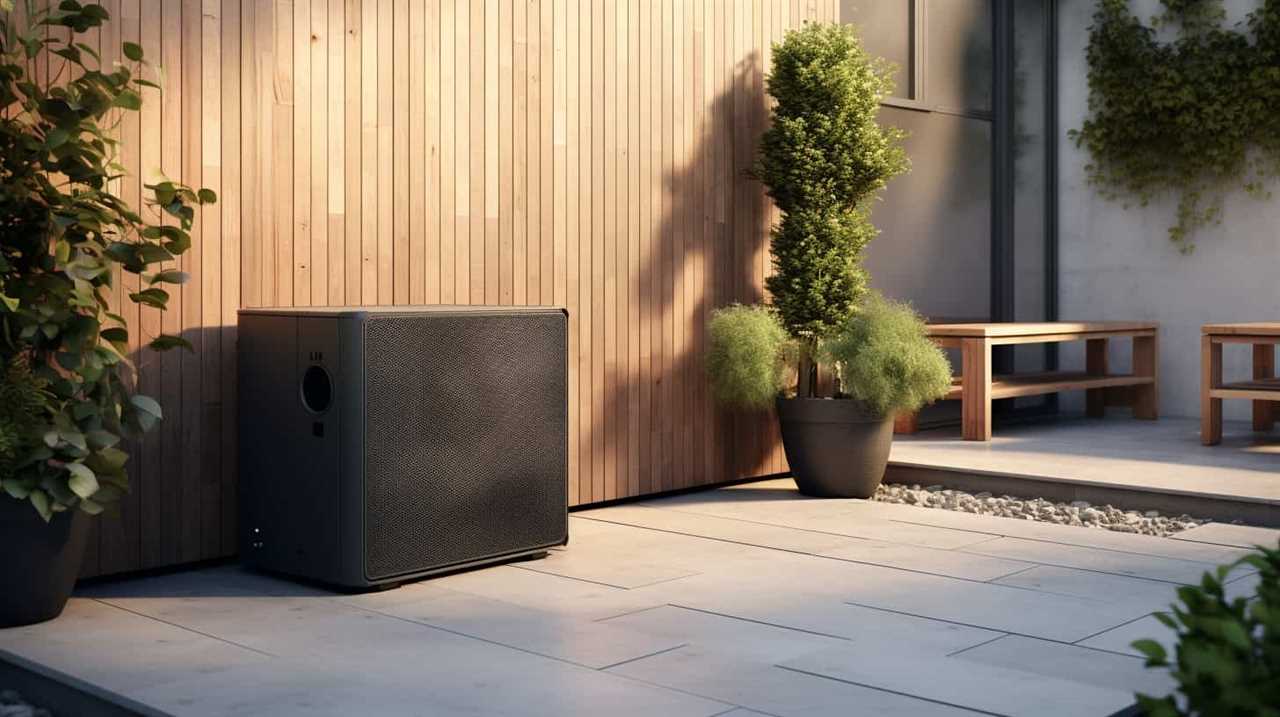
Tips for Maximizing HVAC Efficiency With Heat Pump Systems
To optimize HVAC efficiency with heat pump systems, we recommend implementing proper maintenance and regular inspections. By following these energy-saving tips and ensuring regular heat pump maintenance, you can maximize the efficiency of your HVAC system.
Firstly, it’s important to clean or replace air filters regularly. Dirty filters restrict airflow and reduce the system’s efficiency. Additionally, keeping the outdoor unit clean and free from debris allows for better heat exchange.
Next, consider installing a programmable thermostat. This allows you to set different temperatures for specific times of the day, ensuring your system only runs when needed.
Regularly checking and sealing any air leaks in your home can also help improve efficiency. Leaks can waste energy by allowing conditioned air to escape and allowing unconditioned air to enter.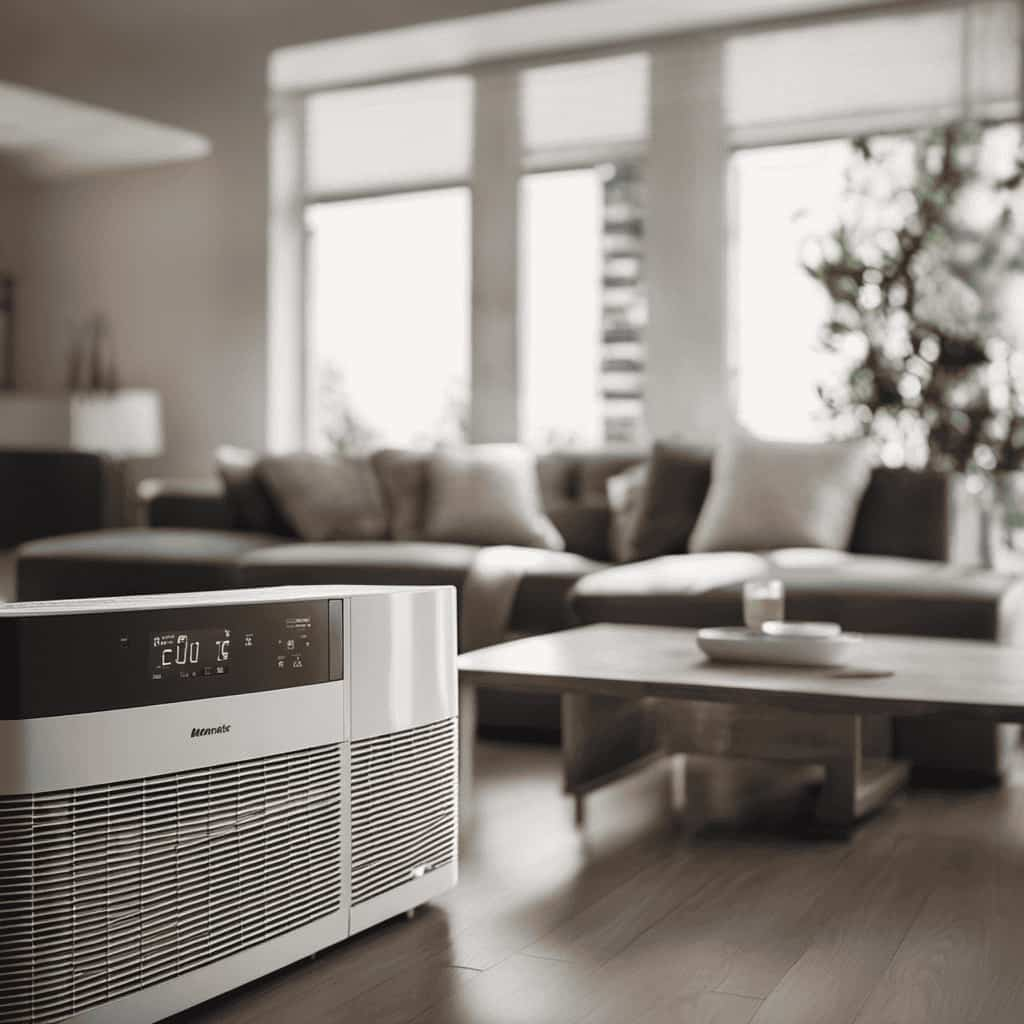
Lastly, scheduling professional maintenance and inspections twice a year can ensure that your heat pump system is running at its peak efficiency. A professional can identify and address any issues before they become major problems.
Case Studies: Real-Life Examples of HVAC Efficiency Gains With Heat Pump Systems
We frequently examine real-life case studies that demonstrate the HVAC efficiency gains achieved with heat pump systems. These case studies provide real-world examples of how heat pump systems can significantly improve HVAC efficiency.
Here are two sub-lists that showcase the benefits of heat pump systems:
Case Study 1: Residential Setting
- A homeowner in a cold climate replaced their traditional HVAC system with a heat pump system.
- The heat pump system reduced their heating costs by 30% and their cooling costs by 40%.
- The homeowner also experienced improved comfort levels throughout their home.
Case Study 2: Commercial Building
- A commercial building in a hot and humid area upgraded their HVAC system to a heat pump system.
- The heat pump system reduced energy consumption by 25% and lowered maintenance costs.
- The building occupants reported increased satisfaction with the indoor air quality and temperature control.
These case studies demonstrate the real-life benefits of using heat pump systems to achieve HVAC efficiency gains. By adopting this technology, both residential and commercial properties can enjoy significant energy savings and improved comfort.
Frequently Asked Questions
How Much Does a Heat Pump System Cost to Install and Maintain?
Installing and maintaining a heat pump system can vary greatly in cost. However, when considering the cost comparison and potential energy savings, investing in a heat pump system can lead to long-term savings and increased HVAC efficiency.
Are Heat Pump Systems Suitable for Both Residential and Commercial HVAC Applications?
Heat pump systems offer remarkable efficiency gains in both residential and commercial HVAC applications. The benefits include increased energy savings, reduced carbon footprint, and improved indoor comfort. They’re a cost-effective and sustainable solution for all your heating and cooling needs.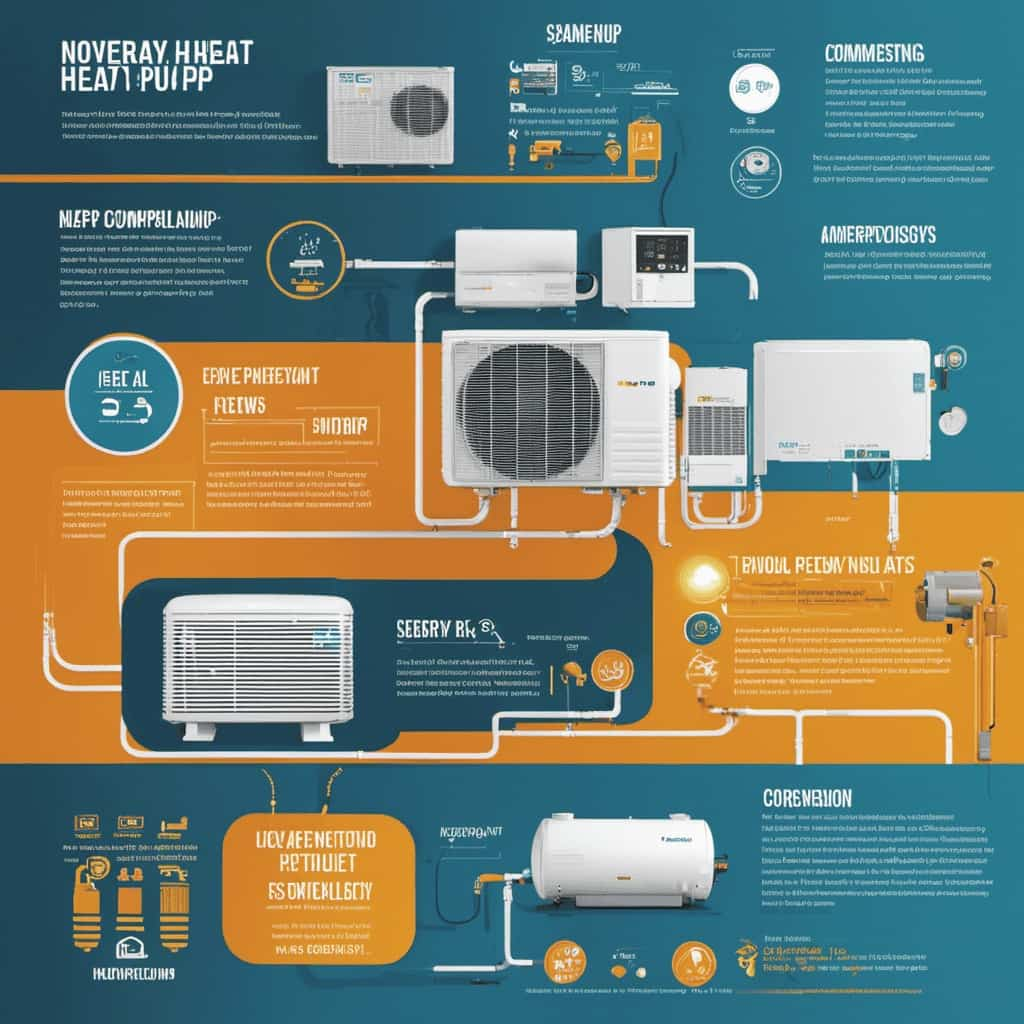
What Is the Lifespan of a Heat Pump System and When Should It Be Replaced?
When it comes to the lifespan of a heat pump system and signs of replacement, it’s important to consider factors like regular maintenance, efficiency decline, and major repairs. Consulting with a professional can help determine the best course of action.
Can Heat Pump Systems Be Used in Conjunction With Other HVAC Systems?
Yes, heat pump systems can be used in conjunction with other HVAC systems. By integrating a heat pump with traditional HVAC, we can achieve greater efficiency and energy savings, ensuring optimal comfort and liberation from high energy costs.
Are There Any Government Incentives or Rebates Available for Installing a Heat Pump System?
Government incentives and rebates are available for installing heat pump systems, providing energy savings and reducing costs. These incentives vary depending on location and may include tax credits or utility rebates.
How Do Heat Pump Systems Help in Saving Energy for HVAC Systems?
Heat pump systems play a vital role in conserving energy for HVAC systems. These energy-efficient heat pump systems reviewed have the ability to extract heat from the outside air, even during colder months, and transfer it indoors. By utilizing this renewable source of energy, heat pumps drastically reduce the amount of electricity required for heating and cooling, resulting in substantial energy savings.
Conclusion
In conclusion, heat pump systems are the superheroes of HVAC efficiency, swooping in to save the day with their incredible energy-saving abilities. With their key features and benefits, heat pump systems elevate the efficiency of HVAC systems to new heights.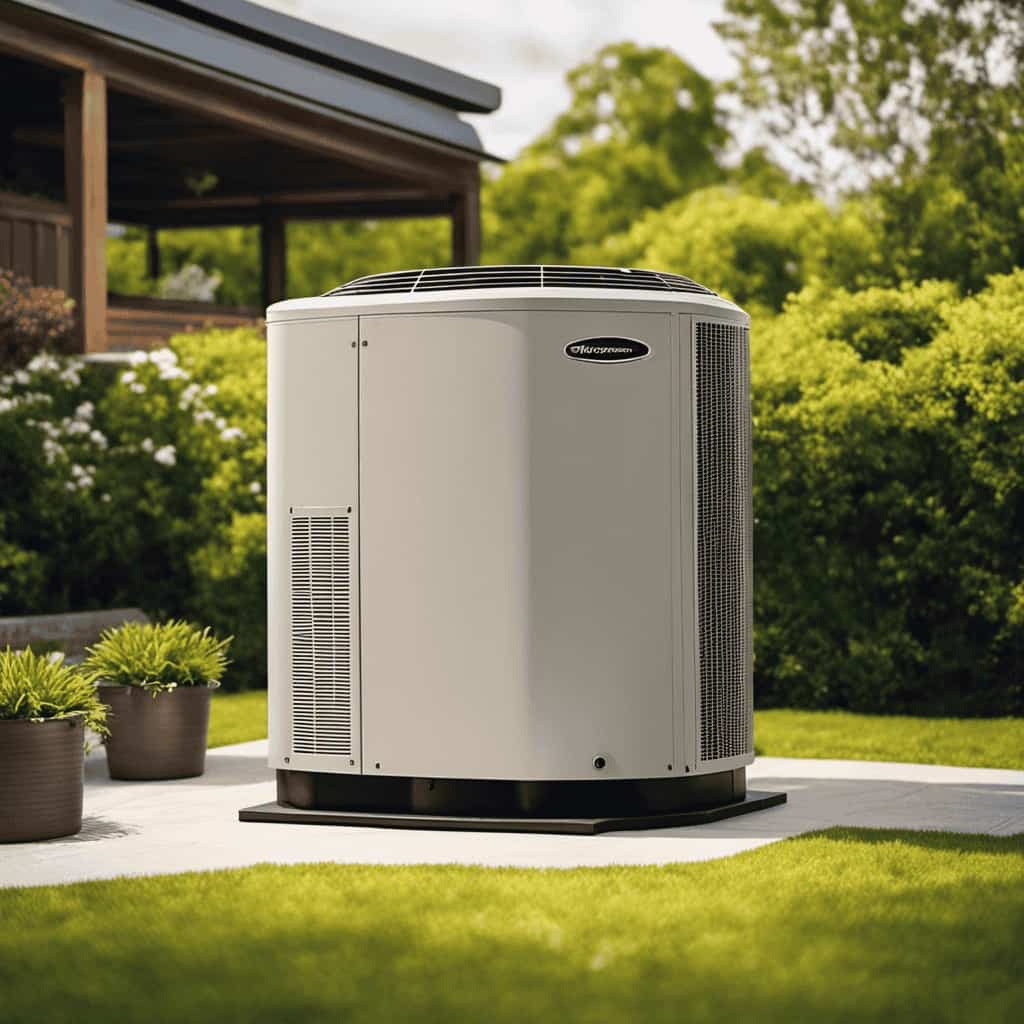
By following our tips, you can maximize the efficiency gains and witness the magic of heat pumps firsthand. So join the efficiency revolution and let heat pump systems be the driving force in your HVAC journey.
Together, we can conquer energy wastage and create a more sustainable future.
-

 Residential and Commercial Applications3 months ago
Residential and Commercial Applications3 months agoBest Amana Heat Pump Reviews
-

 Thermal Energy Transfer3 months ago
Thermal Energy Transfer3 months agoBreakthroughs in Modern Heat Pump Systems: Thermal Energy Edition
-

 Residential and Commercial Applications3 months ago
Residential and Commercial Applications3 months agoBest Heat Pump
-

 Geothermal Heat Pumps2 months ago
Geothermal Heat Pumps2 months agoUpgrade Your Comfort with Our Efficient HVAC Systems
-

 Geothermal Heat Pumps2 months ago
Geothermal Heat Pumps2 months agoInnovative Geothermal Heat Pump Manufacturers Revolutionize Energy Efficiency
-

 Air Conditioning4 weeks ago
Air Conditioning4 weeks agoExploring Energy-Efficient Air Conditioning Heat Pumps
-

 Thermal Energy Transfer3 months ago
Thermal Energy Transfer3 months agoBoost Your Heat Pump Efficiency: Interactive Guide
-

 Residential and Commercial Applications3 months ago
Residential and Commercial Applications3 months agoBest Portable Heat Pump Heat & AC











